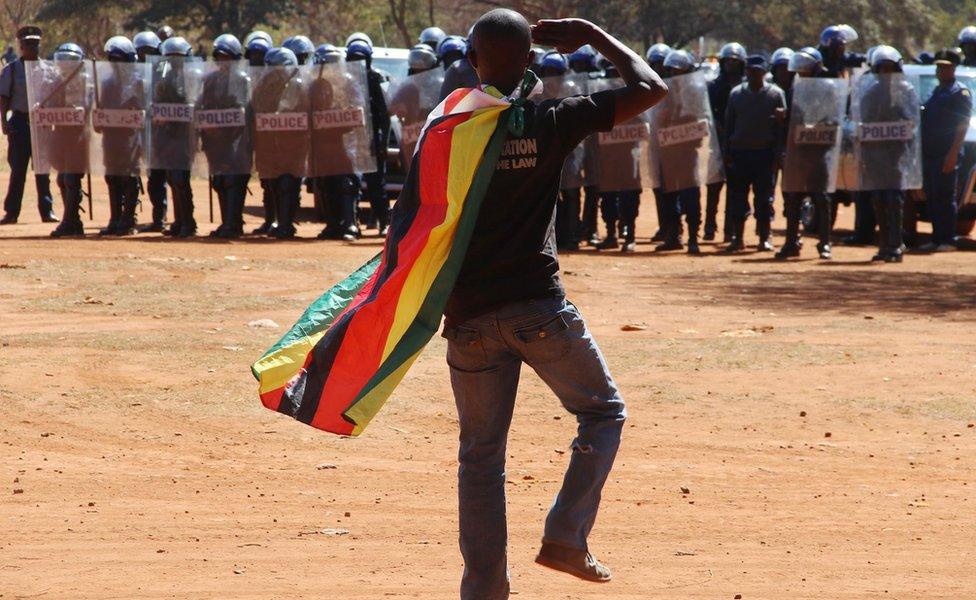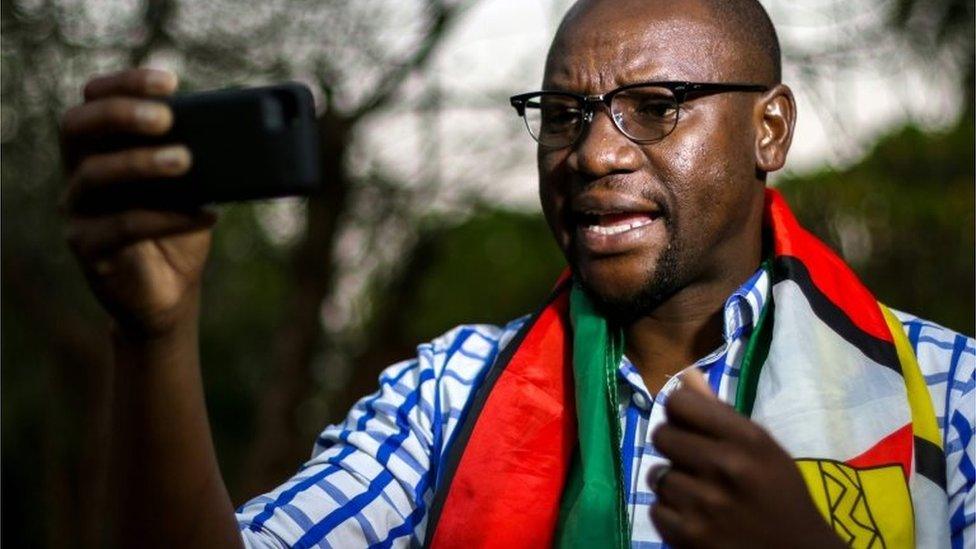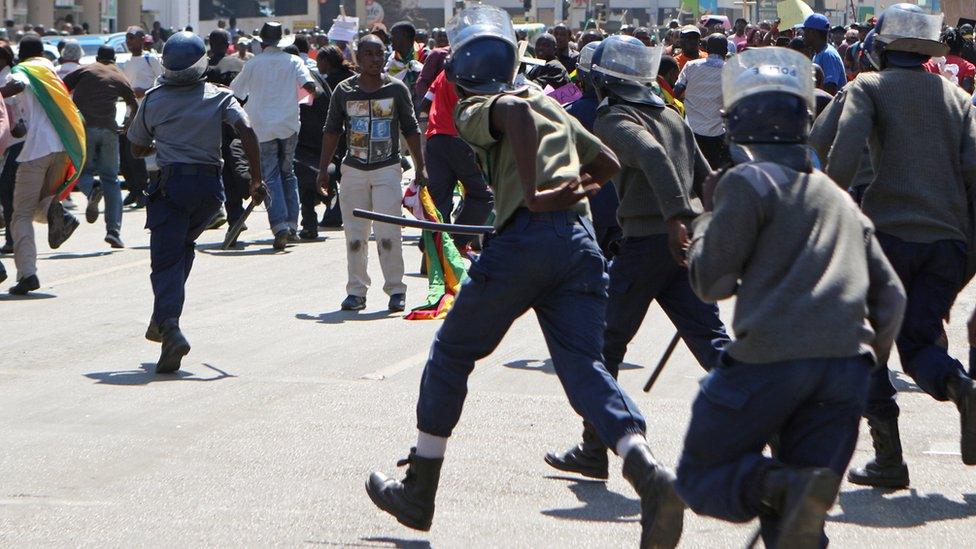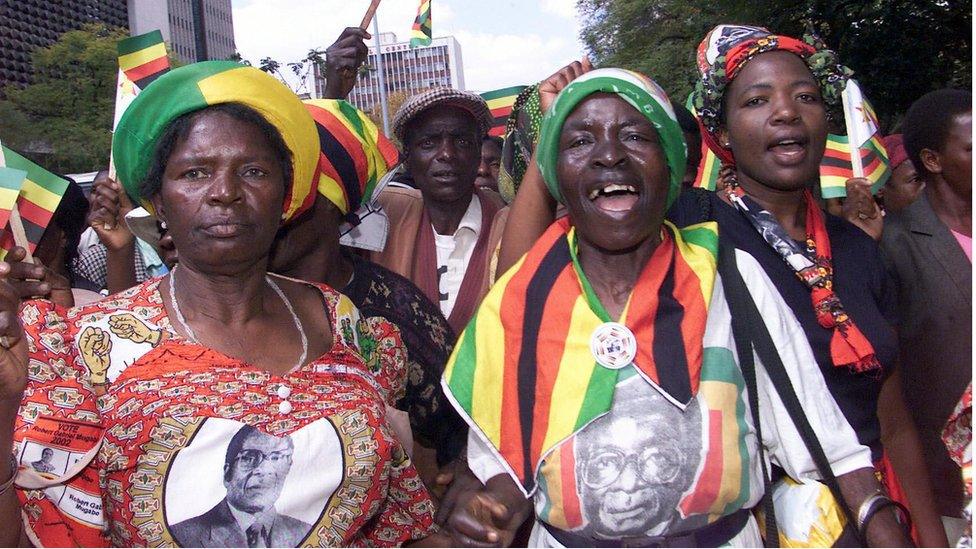Letter from Africa: To salute or slur a flag?
- Published

In our series of letters from African journalists, film-maker and columnist Farai Sevenzo considers efforts by the authorities in Zimbabwe to protect the country's flag.
Steps are under way by the Zimbabwean authorities to protect the nation's flag, which has featured heavily in the news this year, from what they call "abuse" and "disrepute".
As flags go, the southern African nation's flag is not one you might spot at the beach, covering personal assets in a two-bit bikini or designed as a pair of golfing slacks.
It is a flag of nationhood that resurfaced in the headlines after a young preacher urged his fellow citizens to reclaim it from the politicians - to show loyalty to the nation the flag represents, rather than to the politicians who will be dead long before the flag and its symbolism have expired.
It comes as no surprise, then, that Harare's politicians have sought to curtail the flag's presence on the streets.
They have been irked by the recurring images of young men and women protesting while draped in the flag, of lawyers volunteering to defend the pastor, who while dressed in the gold, green, black, white and red stripes of the flag was accused of attempting to overthrow the government, and the loyalty shown to the #ThisFlag movement following its explosion on social media.

Pastor Evan Mawarire, draped in the national flag, began posting videos in April asking Zimbabweans "to be bold"
Victoria Mabhiza, permanent secretary in the justice ministry, issued a statement last week warning that citizens "who participate in any action or activity involving the national flag or bring the national flag into disrepute" are likely to face a $200 (£154) fine and/or six months in jail.
She also warned that "anyone who imports, manufactures or sells the national flag without permission, or burns it or mutilates it, risks prosecution".
Ms Mabhiza forgets that when the urge for change begins, wild horses cannot hold it back and the move points more to unharnessed panic within the ruling party than to any incidents of criminality amongst random flag users.

More on Zimbabwe's economic crisis:

Government has physically run out of cash because the country imports more than it exports
It abandoned its own currency in 2009 in order to stem runaway inflation - and now mainly uses the US dollar or South African rand
Plans to introduce local "bond notes", pegged to the dollar, next month which have sparked protests
Formal employment stands at about 10% - many make their living doing cross-border trading.

Flags command deep respect and stir deeper emotions.
All over the world, the issue of flags and their desecration is an important one because they are a symbol of a state and its people.
Not valuing a flag is seen by some as an act of war.
In centuries of human history, emblems on cloth have been erected and pulled down.
All across modern Africa, the first moment of statehood began with the lowering of one flag and the raising of another - in Zimbabwe's case the Union Jack gave way to the flag of independent Zimbabwe as the old green and white flag of colonial separatist Rhodesia was confined to the dustbin of history without any acknowledgement that it had ever existed.
But supremacists who live in cyberspace have wistfully clung to it, as we saw back in June 2015 when Dylann Roof murdered nine churchgoers in the US city of Charleston, and proudly resurrected the flags of Rhodesia and apartheid South Africa, external.

A Facebook photo shows Dylann Roof wearing a jacket with an apartheid-era flag and one from Rhodesia, now Zimbabwe
There are those who would say he was not abusing these flags but venerating them and the ideology they represent.
Back in 2009, South Africa's then-police chief Bheki Cele ordered a small replica of the old South African flag to be removed from the office of a junior Metrorail worker in Durban.
His efforts failed as the move was deemed unconstitutional.
Pierre de Vos, a constitutional law expert, explained at the time: "Many people would say it [the old flag] is an eyesore. But freedom of speech also means that we must accept points of view we find appalling."

Farai Sevenzo:

"What of the thousands of loyal party supporters who have no problem draping President Robert Mugabe's image across their buttocks as they sing and ululate his praises? Are they not ridiculing the office of the president?"

Flags, by their very nature, are not easily abused: Those who have sought to burn them have also been said to be exercising their freedom of speech.
And then there are those who have sought to change their flags so they chimed more with the times and the self-perception of their nations.
Australia and New Zealand have grappled with the presence of the Union Jack on their national flags, Malawi has changed the symbol of the setting sun to a rising sun on her flag, while Libya, still divided after the colonel's death, has abandoned Muammar Gaddafi's plain green for jihadist black or the old royal flag.
Police beatings
But it is doubtful that the move against the use and sales of the national flag has been deeply considered in Zimbabwe.
It all smacks of the kind of over-reaction that has brought soldiers, riot police and water cannon on to the streets of Harare in recent weeks.

Police have now banned marches in the capital, Harare, until mid-October
Images of police officers' heavy-handed response to protests have emerged, where the clear blue skies of a September spring have been interspersed by clouds of tear gas and the indiscriminate police beatings of bystanders in the streets, including women and children.
In seeking to stem the rising tide of rebellion, the government is attempting to stop street vendors from selling the flag to passing motorists while putting nothing in place to allow the 90% unemployed - some of whom happen to sell flags made in China at Harare traffic lights - to seek alternative employment.
And who determines what "flag abuse" looks like?

Supporters of President Mugabe also wear the national flag
Will the football fans travelling to Gabon in 2017 for their first Africa Cup of Nations tournament in decades be asked to hand over flags at the airport?
Can the police arrest a man in a cricket kit featuring the national flag?
What of the thousands of loyal party supporters who have no problem draping President Robert Mugabe's image across their buttocks as they sing and ululate his praises? Are they not ridiculing the office of the president?
Even the first lady has mentioned her dislike for such lascivious dancing in front of her husband. And when they drape the national flag across their dancing hips in praise of "his excellency", or turn the national flag into bandanas as they march in the ruling party's youth league, is this not abuse of the flag?
It is sometimes a politician's delusion that running a country, even for as long as 36 years, makes all its emblems a personal collection belonging to one family, for use by him and his relatives, and his loyal friends.
History, of course, is littered with dead despots who run out of time before being draped in the flags they claimed to be protecting, for the final time.
More from Farai Sevenzo:
